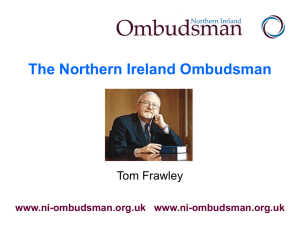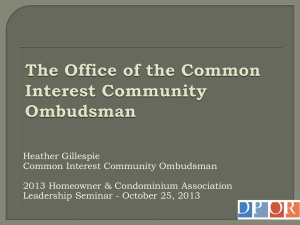DOC - Office of the Ombudsman
advertisement
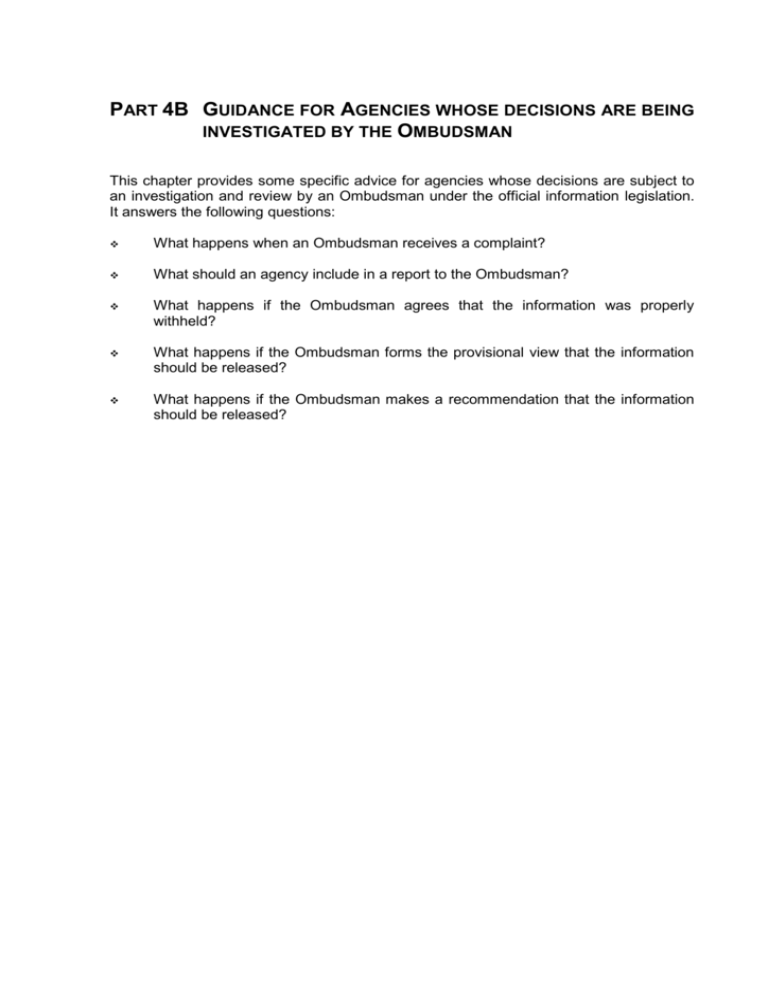
PART 4B GUIDANCE FOR AGENCIES WHOSE DECISIONS ARE BEING INVESTIGATED BY THE OMBUDSMAN This chapter provides some specific advice for agencies whose decisions are subject to an investigation and review by an Ombudsman under the official information legislation. It answers the following questions: What happens when an Ombudsman receives a complaint? What should an agency include in a report to the Ombudsman? What happens if the Ombudsman agrees that the information was properly withheld? What happens if the Ombudsman forms the provisional view that the information should be released? What happens if the Ombudsman makes a recommendation that the information should be released? Part 4B Guidance for agencies whose decisions are being investigated -2- What happens when an Ombudsman receives a complaint? Upon receiving a complaint under the official information legislation, an Ombudsman will first consider whether or not it is a complaint that should be investigated. Part 4A outlines the reasons why an Ombudsman may choose not to investigate a complaint. Once a decision has been made to investigate the complaint, an Ombudsman will decide whether to: (a) attempt to resolve the complaint through informal enquiries; or (b) commence a formal investigation. Informal enquiries will usually be considered appropriate where the complaint is about a failure to respond to a request, or if the complaint is an urgent one. In this case, the Investigating Officer assisting the Ombudsman concerned will contact the agency in order to ascertain why the request has not been responded to, or will arrange an urgent meeting in order to discuss the complaint. If an Ombudsman decides to commence a formal investigation, he or she will write to the chief executive or principal administrative officer of the agency to notify his or her intention to undertake an investigation. An Ombudsman will convey the requester’s complaint to the agency, and ask the agency to prepare a report in response to the complaint. If information has been withheld, the agency will be asked to provide a copy to the Ombudsman. What should an agency include in a report to an Ombudsman? A report to an Ombudsman should include: an explanation as to which section(s) of the legislation were relied upon to refuse the request or to withhold particular information; an explanation as to the reasons why it was considered to be necessary to rely upon those particular sections of the legislation; and if information has been withheld, a copy of that information. The precise nature of the report will vary, depending upon the nature of the complaint and the sections of the legislation that have been relied upon. Administrative grounds for refusing a request If the request was refused on one of the administrative grounds of the legislation, 1 it may not be possible or appropriate to provide an Ombudsman with a copy of the information. If this is the case, the agency’s report should explain why the information has not been provided. When preparing a report explaining why an administrative ground of the legislation has been relied upon to refuse a request, an agency should: 1 explain precisely why it was considered necessary to rely upon this ground; and Sections 18(d), (e), (f), (g) or (h) OIA; sections 17(d), (e), (f), (g) or (h) LGOIMA Part 4B Guidance for agencies whose decisions are being investigated -3- (where relevant) address the issues which are discussed in Part 2A of these guidelines. Other reasons for withholding information Where the reasons for withholding information are not administrative reasons, an Ombudsman will ask the organisation to report on its essential concerns about release of the information. In most cases an Ombudsman is not seeking a detailed legal argument, but rather a comprehensive explanation of the harm that the agency predicts will arise if the information is released and precisely how that harm will occur. When preparing a report as to the reasons why a particular withholding ground has been relied upon, an agency should refer to the discussion of that withholding ground in these guidelines. This will help an agency to provide a comprehensive report to an Ombudsman, and reduce the likelihood that the Ombudsman will need to make further enquiries before forming a provisional view. In the words of Casey J in Commissioner of Police v Ombudsman:2 “In the nature of things he who alleges that good reason exists for withholding information would be expected to bring forward material to support that proposition.” If, during the course of an investigation, the agency decides to release the information (thereby resolving the complaint), it should advise the Ombudsman concerned accordingly. An Ombudsman is always prepared to discontinue an investigation where a solution acceptable to all parties emerges. What happens if an Ombudsman agrees that the information was properly withheld? If, after reviewing the information and considering both the agency’s report and the requester’s submissions, an Ombudsman forms an initial view that the information was properly withheld, he or she will write to the requester expressing a 'provisional view'. The reasons for reaching that provisional view will be explained, and the requester will be given an opportunity to make further submissions before the Ombudsman forms any final views. After considering any additional submissions, an Ombudsman may remain of the view that the information was properly withheld. He or she will then write to both the agency and the requester expressing that final view, the reasons upon which it is based, and will conclude the investigation on that basis. 2 [1988] 1 NZLR 385, 411 Part 4B Guidance for agencies whose decisions are being investigated -4- What happens if an Ombudsman forms the provisional view that the information should be released? If, after considering the information together with the agency’s report and the requester’s submissions, an Ombudsman forms the provisional view that the information should not have been withheld, that Ombudsman will write to the agency expressing that provisional view and will explain the reasons upon which it is based. An Ombudsman will provide the agency with an opportunity to respond to his or her provisional view, and will consider any response carefully before forming any final views. In many cases agencies decide to release information if an Ombudsman forms the provisional view that it should not have been withheld. What happens if an Ombudsman makes a recommendation that the information should be released? If, after considering any submissions that an agency makes in response to a provisional view, an Ombudsman remains of the view that the information should not have been withheld, he or she has the power to “recommend” that the information be released. The recommendation process A more detailed explanation of the recommendation provisions is set out in Part 4A. In brief, if an Ombudsman decides to make a recommendation, he or she will write to the agency, the relevant Minister and the requester to formally convey the recommendation. Once twenty-one working days have passed since the day on which the recommendation was made, a public duty is imposed on the agency to observe the recommendation. The only exception to this is if, prior to the twenty-first day, the Governor-General in Council,3 by Order in Council, directs that the information should not be released. If this occurs, the Minister who recommended the making of that Order in Council must give a copy of the Order in Council to the Ombudsman concerned. In the case of the OIA, every Order in Council: 4 must set out the reasons for the decision and the grounds in support of the decision; and shall be published in the Gazette. In the case of the LGOIMA, every such decision made by a local authority:5 must set out the reasons for the decision and the grounds in support of that decision; the source and purport of any advice on which the decision is based; be published in the Gazette; and 3 Or the local authority, by resolution made at a meeting of that local authority, decides otherwise and records that decision in writing 4 Section 32A OIA 5 Section 33 LGOIMA Part 4B Guidance for agencies whose decisions are being investigated -5- be publicly notified within the district of that local authority as soon as practicable after it is made. An Order in Council or a decision by the local authority directing that the information not be released may be made for: “all or any of the reasons for the decision reviewed by the Ombudsman (being reasons that were before the Ombudsman when the recommendation was made) but for no other reasons”. Judicial Review Where an Order in Council or a decision by the local authority directs that the information should not be released, the person who made the request may apply to the High Court for a review of the making of that Order in Council or of that decision. In such a case, unless the High Court is satisfied that such an application has not been reasonably or properly brought: “it shall, in determining the application and irrespective of the result of the application, order that the costs of the applicant on a solicitor and client basis shall be paid by the Crown [or the local authority]”. An Ombudsman does not have any involvement in the requester’s application for judicial review. An Ombudsman does, however, have the ability to report an agency to Parliament if it does not comply with a recommendation.


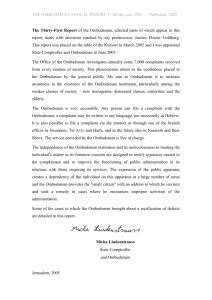
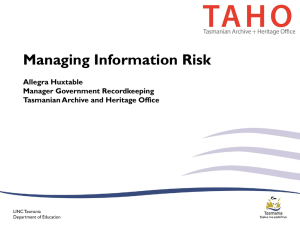
![Chapter_9[1]](http://s2.studylib.net/store/data/005745019_1-cf7106a59891cefb65717917942c12cd-300x300.png)
